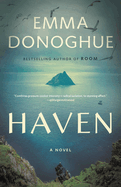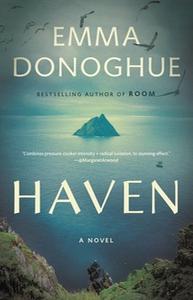
 In Emma Donoghue's deliciously claustrophobic 12th novel, Haven, three seventh-century monks set sail for an island off the coast of Ireland. Their project of founding a new monastery will be beset by scarcity, personality clashes and everyday disasters.
In Emma Donoghue's deliciously claustrophobic 12th novel, Haven, three seventh-century monks set sail for an island off the coast of Ireland. Their project of founding a new monastery will be beset by scarcity, personality clashes and everyday disasters.
Artt has a dream, "an instruction to withdraw from the world. To set out on pilgrimage with two companions… and found a monastic retreat." He chooses 19-year-old Trian and Cormac, an older man. This shabby trinity leaves the monastery in a small boat packed with meager supplies. A fraught journey delivers them to the Great Skellig, a craggy island where their days are marked by privation and repetitious tasks. A dropped bag of flour or an infected leg wound could mean the difference between life and death. Although the rituals of daily prayer and weekly Communion, and the recounting of legends, feed the soul, the body is another matter: "Hunger is a constant argument."
The Great Skellig, previously unvisited by humankind, seems like a kingdom of seabirds. The novel is saturated with the sight and sound of thousands of birds. Covid-19 prevented Donoghue from visiting the island in person (which she reveals to be Skellig Michael in an author's note), but her research into similar religious quests and deep knowledge of the region's flora and fauna fuel vivid scenes. The encounters with great auks are particularly striking. Artt kills one of the flightless birds as a sacrifice, and various species provide food, quill pens, ink and cooking oil.
Donoghue (The Wonder; Frog Music) excels at creating isolated atmospheres and examining the dynamic of small casts of characters--as in Room or The Pull of the Stars. Here, the island is a microcosm where conflicts flare. Artt is a harsh, single-minded leader. Cormac is practical, planting a garden and digging a cistern. Trian is a free spirit, given to fashioning instruments or doodling in the margins of the Psalter they're copying. Artt, despising difference, quashes Trian's creativity. There is a fundamental difference of opinion about resources, with Artt declaring all of nature as being for human benefit and Trian replying, "We shouldn't take more than we need, though, surely Father?" Knowledge of the great auk's future extinction reinforces a subtle environmentalist message.
Haven may be just one letter away from heaven, but this island community looks less like either and more like a prison as time goes on. A powerful study of religious obsession and confinement, this is one for readers of Matrix and To Paradise. --Rebecca Foster, freelance reviewer, proofreader and blogger at Bookish Beck
Shelf Talker: Emma Donoghue's 12th novel is an intense character study of three seventh-century monks who found a monastery on a remote Irish island.

